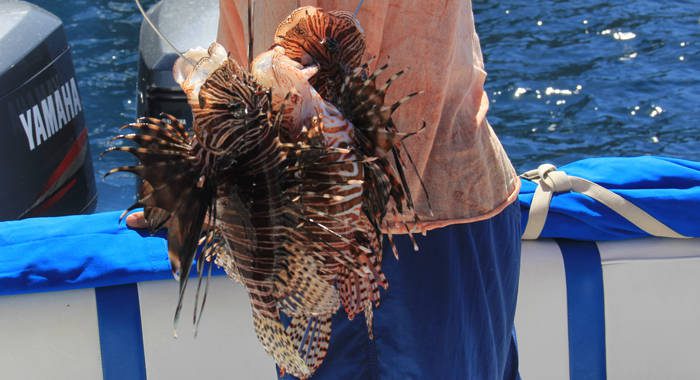The St. Vincent and the Grenadines One Health Project Team is contributing to the efforts to reduce and to eventually eliminate the lionfish invasive species in the nation’s waters, specifically in the Grenadines.
One Health Project Team spoke of its efforts at a press briefing in Kingstown on Wednesday.
Team member, Kerry-Ann Hamilton, counsellor at the SVG Community College, said the aim of the One Health Project is to “improve health and well-being through the prevention of risk and mitigation of effects of crisis that originate at the interface between humans, animals, and their various environments”.
Hamilton said there will be several activities to create further awareness of the lionfish and its effects on local fish populations.
These activities include visits to secondary and primary schools in the Grenadines, poster competitions, and cook-offs.
To ensure a multi-sectoral approach, Hamilton explained that the One Health Project Team will collaborate with the SVG Hotel and Tourism Association, the Mayreau Regatta Association, Sustainable Grenadines (SusGren), Dive shops, Tobago Cays Marine Park, and fisher folk organisations.
Senior Environmental Health Officer in the Ministry of Health, Wellness and the Environment, Todd Lewis, said he is privileged to be a member of the One Health Project leadership team.
Lewis emphasised that health issues are becoming increasingly significant to SVG.
He added that the environment, on a whole, is at the centre of everything that we do in SVG.
Lewis said wellness always incorporates people regardless of the topic, since everything is interconnected in this particular chain.
The One Health Project Team is a component of the One Health Leadership Series to enable and empower professionals from the health, agriculture, and environment sectors to play leadership roles on cross-sectoral issues in Caribbean countries.
This initiative is spearheaded and funded by the University of the West Indies, World Health Organisation (WHO), Pan American Health Organisation (PAHO), Inter American Institute for Cooperation on Agriculture (IICA), and the Food and Agriculture Organisation (FAO).
The project was first launched in November 2014 at the Rex Resorts Turtle Beach Hotel in Tobago and will conclude in March of 2017.
Besides Hamilton, the core leaders of the One Health Project Team are Malaika Glasgow and Kathian Herbert-Hackshaw of the Animal Health and Production Division, Ministry of Agriculture. Other team members are Senior Fisheries Assistant, Shamal Connell, Senior Environmental Health Officer, Todd Lewis, and Senior Tourism Officer, Annille Beache.
(API)







Not helping to wipe out Lion Fish because they are here to stay, what the heading should have said was “helping to control”.
The message needs to be spread that they are very good to eat. Its all in the preparation as with most things. The more people that hunt them the better. As Peter says they cannot be eradicated as they are too widespread now. They have found ideal breeding and feeding grounds throughout the Caribbean. They will exact a high toll on the indigenous fish because of their voracious appetite. I was in ST Thomas a couple of years ago and the divers were given markers – a weight a ribbon or tape approx. 2 to 3 mtrs and a float. This was to be dropped and the float allowed to rise up to indicate that there have been sightings of Lionfish around. Its a calling card to other divers / snorkelers to deal with them.